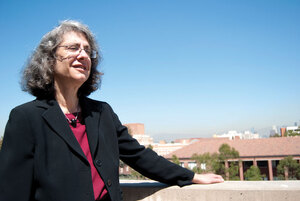USC professor wins MacArthur award for work in mental health policy
Elyn Saks has a long list of accomplishments.
The professor and associate dean at the Gould School of Law was valedictorian at Vanderbilt University, has a master in letters from the University of Oxford, published four books and earned her J.D. from Yale University, where she edited the Yale Law Review.

Genius · USC professor Elyn Saks, schizophrenic herself, will use her MacArthur grant to write a book featuring others with schizophrenia. - Vicki Yang | Daily Trojan
Most recently, Saks was named one of 24 fellows by the MacArthur Foundation, which awards recipients $500,000 to pursue their own creative, intellectual and professional goals. She is the first USC faculty member to be recognized by the organization.
She also has schizophrenia.
Schizophrenia, a mental illness that varies in severity from person to person, is typically characterized by hallucinations and delusions. Those affected by it often have difficulty functioning in day-to-day life.
Saks began to show signs of the illness while she was a student at Oxford, but it was not until she was at Yale — and hospitalized for the third time — that she was diagnosed.
“I was devastated,” she said.
A psychiatrist told her she should take a year off from school to find a less stressful occupation, suggesting the overachieving Saks take a job as a cashier.
“It’s like a sentence to a bleak and painful life,” she said. “People said, ‘Lower your expectations,’ and so on, and I just didn’t.”
Saks went on to complete her studies at Yale and enter the professional world, working as an attorney in Connecticut and teaching at the University of Bridgeport School of Law before coming to USC in 1989.
Here, her colleagues said, Saks has flourished.
“She’s exemplary,” Gould Dean Robert Rasmussen said. “She has nothing but the highest scholarly standards, she’s always supporting her colleagues and inspiring each of us. It’s almost unfathomable what she’s been able to do. Her story is incredibly gripping and moving, and the fact that she has overcome so much and been able to succeed is astonishing.”
Much of that inspiration comes from the work Saks has done. Saks, who has focused her career on mental health policy, has played an important role in the discussions of a multitude of mental health issues, including patients’ rights, the legal aspects of multiple-personality disorder and involuntary treatment.
“I like to think the policies I come up with are not biased because I’m a disgruntled ex-patient. I do propose things that wouldn’t have helped me but would have helped someone else,” she said. “When I do my scholarship, I’m on all sides of the couch so to speak. I used to represent people who were psychiatric patients and I do some consulting and I teach about mental health law … and then I have my own experiences.
“I like to think I can look at things from lots of different angles and that proves my scholarship instead of detracts from it.”
Although Saks might draw some inspiration from her past experiences, those who work with her — all of whom know about her diagnosis — say she is not defined by them.
“I don’t even think it’s a question of balancing mental health issues and professional life,” said Gould Professor Edward McCaffery, who has worked with Saks since 1989. “She’s been able to — beginning with her own will, her own agency — she’s been able to take control of her mental health condition and lead a normal, professional, high-functioning life.”
Saks said she has been able to better cope with her illness through her work.
“I’m lucky that I love to work. It really serves me well — it gives me a sense of focus and productivity and self-esteem,” she said. “For me, it’s one of the last things to go, so even if I’m starting to unravel, I can come into my office, sit and start writing an article or revising an article and that can focus my mind and push the other stuff to the fringes.”
But, Saks said, she is not the only one who has been able to manage her schizophrenia and be successful in the professional world.
Along with researchers from USC and UCLA, Saks is in the process of studying 20 high-functioning schizophrenics who, like herself, have developed ways to manage their symptoms to work as high-level professionals. They hope to use their research to develop a coping method for people with lower-functioning schizophrenia.
“Sometimes people tell me, ‘Elyn, you’re unique. There aren’t other people with schizophrenia like you.’ But that’s not true. We have an MD, we’ve got a couple of PhDs, some consumer advocates, full time students,” she said. “So I’m certainly not unique.”
To help other people with schizophrenia, Saks said the first thing she plans to do with her “genius grant” from the MacArthur Foundation is publish another book — this one a general interest book with interviews from other people with schizophrenia.
“I’ve told my story in my book, but I want to tell their stories,” she said.
Overall, Saks said one of her biggest goals — through her current work and future plans — is to encourage people with schizophrenia to not be held back by their diagnosis.
“I’m a really stubborn person, and that’s helped me and hurt me,” she said. “It’s helped me by saying, ‘You think I have this and I won’t be able to work? Well I’ll show you.’”
And, according to McCaffery, Saks has done just this.
“It’s not being a mental health patient half the time and a professional half the time,” he said. “She’s just Elyn Saks.”
